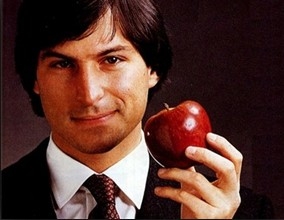But many others realized that despite his temperamental failings, Jobs had the charisma and corporate clout that would lead them to “make a dent in the universe.” Jobs told the staff that Raskin was just a dreamer, whereas he was a doer and would get the Mac done in a year. It was clear he wanted vindication for having been ousted from the Lisa group, and he was energized by competition. He publicly bet John Couch $5,000 that the Mac would ship before the Lisa. “We can make a computer that’s cheaper and better than the Lisa, and get it out first,” he told the team.
但其他很多人意識(shí)到,盡管喬布斯有喜怒無(wú)常的毛病,但他非凡的魅力和團(tuán)隊(duì)影響力都足以引領(lǐng)大家改變世界。喬布斯告訴員工,拉斯金只是一個(gè)空想家,而自己是一個(gè)實(shí)干家,他會(huì)在一年之內(nèi)完成Mac項(xiàng)目。很明顯,從麗薩項(xiàng)目中被逐出后,他需要證明自己,而競(jìng)爭(zhēng)可以進(jìn)一步激勵(lì)他。他公開(kāi)與約翰·庫(kù)奇打賭5000美元,賭Mac會(huì)在麗薩之前完工。“我們能夠造出一臺(tái)比麗薩更便宜也更好的電腦,而且我們能更快完成它。”他告訴團(tuán)隊(duì)里的人。
Jobs asserted his control of the group by canceling a brown-bag lunch seminar that Raskin was scheduled to give to the whole company in February 1981. Raskin happened to go by the room anyway and discovered that there were a hundred people there waiting to hear him; Jobs had not bothered to notify anyone else about his cancellation order. So Raskin went ahead and gave a talk.
拉斯金原定于1981年2月要主持一場(chǎng)全公司范圍的自帶午餐的研討會(huì),但喬布斯為了樹(shù)立自己在項(xiàng)目組的威信,宣布取消了研討會(huì)。然而那天拉斯金碰巧走過(guò)會(huì)議室,發(fā)現(xiàn)里面坐了上百人在等著自己發(fā)言。喬布斯根本沒(méi)有把取消研討會(huì)的決定通知項(xiàng)目以外的其他人。于是拉斯金就走進(jìn)去發(fā)表了一番講話。
That incident led Raskin to write a blistering memo to Mike Scott, who once again found himself in the difficult position of being a president trying to manage a company’s temperamental cofounder and major stockholder. It was titled “Working for/with Steve Jobs,” and in it Raskin asserted:
這件事導(dǎo)致拉斯金向邁克·斯科特遞交了一份言辭激烈的備忘錄,斯科特又一次陷入了艱難的境地:身為公司的總裁,他又要去管束那個(gè)喜怒無(wú)常的聯(lián)合創(chuàng)始人兼大股東了。備忘錄的標(biāo)題是“為(和)史蒂夫·喬布斯工作”,拉斯金寫(xiě)道:
He is a dreadful manager. . . . I have always liked Steve, but I have found it impossible to work for him. . . . Jobs regularly misses appointments. This is so well-known as to be almost a running joke. . . . He acts without thinking and with bad judgment. . . . He does not give credit where due. . . . Very often, when told of a new idea, he will immediately attack it and say that it is worthless or even stupid, and tell you that it was a waste of time to work on it. This alone is bad management, but if the idea is a good one he will soon be telling people about it as though it was his own.
? “他是個(gè)糟糕透頂?shù)墓芾碚摺乙恢倍己芟矚g史蒂夫,但我發(fā)現(xiàn)自己無(wú)法為他工作……喬布斯經(jīng)常錯(cuò)過(guò)預(yù)定安排。這個(gè)人盡皆知,幾乎已經(jīng)流傳成笑話了……他總是不經(jīng)過(guò)思考就行動(dòng),而且判斷力很差……他不給別人應(yīng)得的贊揚(yáng)……經(jīng)常發(fā)生的情況是,你告訴他一個(gè)新想法,他會(huì)立刻攻擊這個(gè)想法,說(shuō)它是毫無(wú)價(jià)值的甚至是愚蠢的,并且告訴你研究它就是在浪費(fèi)時(shí)間。光這個(gè)就已經(jīng)很糟糕了,但如果他聽(tīng)到的是一個(gè)好點(diǎn)子,他很快就會(huì)到處宣傳,就好像是他自己想出來(lái)的一樣……他喜歡打斷別人的講話,從不耐心傾聽(tīng)。
That afternoon Scott called in Jobs and Raskin for a showdown in front of Markkula. Jobs started crying. He and Raskin agreed on only one thing: Neither could work for the other one. On the Lisa project, Scott had sided with Couch. This time he decided it was best to let Jobs win. After all, the Mac was a minor development project housed in a distant building that could keep Jobs occupied away from the main campus. Raskin was told to take a leave of absence. “They wanted to humor me and give me something to do, which was fine,” Jobs recalled. “It was like going back to the garage for me. I had my own ragtag team and I was in control.”
那天下午,斯科特叫來(lái)了喬布斯和拉斯金,讓他們?cè)隈R庫(kù)拉面前攤牌。喬布斯開(kāi)始哭泣。他和拉斯金只在一件事上達(dá)成了共識(shí):兩人誰(shuí)都無(wú)法為對(duì)方工作。當(dāng)年在麗薩項(xiàng)目上,斯科特選擇了支持庫(kù)奇。這一次,他認(rèn)為最好能讓喬布斯臝一次。畢竟,Mac只是個(gè)小規(guī)模的開(kāi)發(fā)項(xiàng)目,而且辦公地點(diǎn)在別處,這樣一來(lái)就可以讓喬布斯離開(kāi)公司總部了。于是,拉斯金被要求休假。“他們想要遷就我,給我找點(diǎn)兒事情做,我覺(jué)得挺好,”喬布斯回憶,“對(duì)我來(lái)說(shuō)就好像回到了當(dāng)年的車(chē)庫(kù)一樣。我有了自己的小團(tuán)隊(duì),一切盡在我的掌控之中。”
Raskin’s ouster may not have seemed fair, but it ended up being good for the Macintosh. Raskin wanted an appliance with little memory, an anemic processor, a cassette tape, no mouse, and minimal graphics. Unlike Jobs, he might have been able to keep the price down to close to $1,000, and that may have helped Apple win market share. But he could not have pulled off what Jobs did, which was to create and market a machine that would transform personal computing. In fact we can see where the road not taken led. Raskin was hired by Canon to build the machine he wanted. “It was the Canon Cat, and it was a total flop,” Atkinson said. “Nobody wanted it. When Steve turned the Mac into a compact version of the Lisa, it made it into a computing platform instead of a consumer electronic device.”1
拉斯金遭到驅(qū)逐看起來(lái)也許不是很公平,但事后證明這對(duì)麥金塔項(xiàng)目起到了積極的作用。拉斯金想要的機(jī)器內(nèi)存小、處理器差,使用的是磁帶存貯,沒(méi)有鼠標(biāo),圖形效果也很糟糕。與喬布斯不同,他也許可以將價(jià)格壓到接近1000美元,也許可以幫助蘋(píng)果公司贏得市場(chǎng)份額。但他永遠(yuǎn)也達(dá)不到喬布斯的髙度:?jiǎn)滩妓箘?chuàng)造并推廣的電腦改變了整個(gè)個(gè)人電腦產(chǎn)業(yè)。實(shí)際上,我們也可以看看,如果當(dāng)年按照拉斯金的思路發(fā)展,會(huì)是怎樣的結(jié)果。拉斯金后來(lái)受雇于佳能公司,制造了他一直想要的電腦。“就是佳能貓(CanonCat),這是一個(gè)徹底的敗筆,”阿特金森說(shuō),“沒(méi)人想要它。史蒂夫?qū)ac變成了簡(jiǎn)潔版的麗薩,它不單單是消費(fèi)電子設(shè)備,更是一個(gè)運(yùn)算平臺(tái)。”①——
注釋?zhuān)?/span>
①作者注:1987年3月,第100萬(wàn)臺(tái)Mac下線,蘋(píng)果公司在上面刻上了拉斯金的名字后,將它送給了拉斯金,這讓喬布斯大為不悅。2005年,拉斯金死于胰腺癌,此前不久喬布斯也被診斷患上了該疾病。











